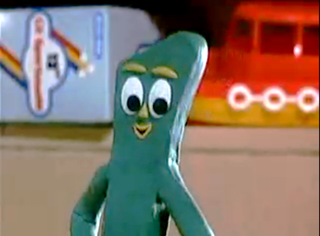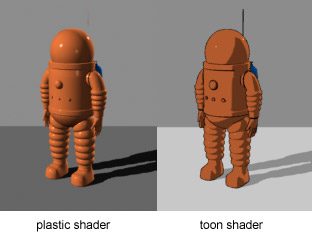Related Research Articles

Gumby is a cartoon character and associated media franchise created by Art Clokey. Gumby is a blocky green humanoid made of clay.

The Magic Roundabout is an English-language children's programme that ran on BBC Television from 1965 to 1977.

Disney Channel is an American pay television channel that serves as the flagship property of Disney Branded Television, a unit of the Disney Entertainment business segment of the Walt Disney Company.

Children's television series are television programs designed specifically for children. They are typically characterised by easy-going content devoid of sensitive or adult themes and are normally broadcast during the morning and afternoon when children are awake, immediately before and after school schedules generally start in the country where they air. Educational themes are also prevalent, as well as the transmission of cautionary tales and narratives that teach problem-solving methods in some fashion or another, such as social disputes.
Modern animation in the United States from the late 1980s to 2004 is frequently referred to as the renaissance age of American animation. During this period, many large American entertainment companies reformed and reinvigorated their animation departments, following the dark age, and the United States had an influence on global and worldwide animation.

Batman: The Animated Series is an American animated superhero television series based on the DC Comics superhero Batman. Developed by Bruce Timm and Eric Radomski, and produced by Warner Bros. Animation, it originally aired on Fox Kids from September 5, 1992, to September 15, 1995, with a total of 85 episodes. Mid-way through the series' run, it was re-titled The Adventures of Batman & Robin.

Creature Comforts is a British stop-motion comedy franchise originating in a 1989 animated short film. The film matched animated zoo animals with a soundtrack of people talking about their homes, making it appear as if the animals were being interviewed about their living conditions. It was created by Nick Park and Aardman Animations. The film became the basis of a series of television advertisements for the electricity boards in the United Kingdom. In 2003, a television series in the same style was released. An American version of the series was also made. A sequel series, Things We Love, first aired on BBC One in 2024.
The terms independent animation or indie animation refers to animated shorts, web series, and feature films produced outside a major national animation industry.

TaleSpin is an American animated television series produced by Walt Disney Television Animation. It first aired in 1990 as a preview-run on The Disney Channel before beginning its main run in syndication later that year as part of the programming block The Disney Afternoon. It features anthropomorphized versions of characters adapted from Disney's 1967 animated feature The Jungle Book, which was theatrically rereleased in the summer before this show premiered in the fall, notably Baloo the Bear, Louie the orangutan, and Shere Khan the tiger, along with new characters created for the show. The name of the show is a play on "tailspin", the rapid descent of an aircraft in a steep spiral, and on the fact that tale is another word for "story". The show is one of nine Disney Afternoon shows to use established Disney characters as the main characters, with the other eight being Darkwing Duck, DuckTales, Chip 'n Dale: Rescue Rangers, Goof Troop, Bonkers, Quack Pack, Aladdin, and Timon & Pumbaa. It is also one of two animated television series based on the book The Jungle Book, the second being Jungle Cubs.

The Walt Disney Company has produced an anthology television series since 1954 under several titles and formats. The program's current title, The Wonderful World of Disney, was used from 1969 to 1979 and again from 1991 onward. The program moved among the Big Three television networks in its first four decades, but has aired on ABC since 1997.

Cel shading or toon shading is a type of non-photorealistic rendering designed to make 3D computer graphics appear to be flat by using less shading color instead of a shade gradient or tints and shades. A cel shader is often used to mimic the style of a comic book or cartoon and/or give the render a characteristic paper-like texture. There are similar techniques that can make an image look like a sketch, an oil painting or an ink painting. The name comes from cels, clear sheets of acetate which are painted on for use in traditional 2D animation.
The History of Canadian animation involves a considerable element of the realities of a country neighbouring the United States and both competitiveness and co-operation across the border.
Mark Dindal is an American filmmaker, animator and voice actor. Best known for his work at Disney, he directed the company's 2000 animated film The Emperor's New Groove (2000), as well as their 2005 film Chicken Little. Prior, he was credited with animation work on the Disney Renaissance films The Little Mermaid (1989) and Aladdin (1992), as well as Tom and Jerry: The Movie (1992). In 1997, he briefly moved to Warner Bros. Animation and made his directorial debut with the film Cats Don't Dance, which won an Annie Award for Best Animated Film. Dindal directed the 2024 animated film The Garfield Movie for Sony Pictures and Alcon Entertainment, which was met with commercial success despite negative reviews.

Disney Television Animation (DTVA) is an American animation production company that serves as the television animation production arm of Disney Branded Television, a division of Disney General Entertainment Content, which is a division of Disney Entertainment, which is one of the three main divisions of The Walt Disney Company. The studio was originally established in 1984, by Gary Krisel during the reorganization and subsequent re-incorporation of Disney following the arrival of then CEO Michael Eisner that year.

Chris Shepherd is a double BAFTA nominated British television/film writer, graphic novelist and director. Born in Anfield, Liverpool in 1967, he is known for combining live action with animation. His work fuses comedy with commentary on the darker side of human nature.
Roland Frederick Godfrey MBE, known as Bob Godfrey, was an English animator whose career spanned more than fifty years. He is probably best known for the children's cartoon series Roobarb (1974), Noah and Nelly in... SkylArk (1976–77) and Henry's Cat (1983–93) and for the Trio chocolate biscuit advertisements shown in the UK during the early 1980s. However, he also produced a BAFTA and Academy award-winning short film, Great (1975), a humorous biography of Isambard Kingdom Brunel. Further Academy Awards nominations received were for Kama Sutra Rides Again (1971), Dream Doll (1979), with Zlatko Grgic, and Small Talk (1994) with animator Kevin Baldwin.
The Dad's Army missing episodes are lost episodes and sketches of the British television sitcom Dad's Army. The programme ran for nine series from 31 July 1968 to 13 November 1977. Three out of six episodes from the second series and two of the four Christmas sketches are missing because, at that time, the BBC routinely reused videotape as a cost-saving measure.
The animated documentary is a moving image form that combines animation and documentary. This form should not be confused with documentaries about movie and TV animation history that feature excerpts.

Channel 5 is a British free-to-air public broadcast television channel owned and operated by Channel 5 Broadcasting Limited, a wholly-owned subsidiary of Paramount Global's UK and Australia division. It was launched in 30 March 1997 to provide a fifth national terrestrial channel in the United Kingdom.
References
- ↑ Thompson, Mark (November 2002). "A press pack published in November 2002 to mark Channel 4's 20 year anniversary" (PDF). Channel Four. pp. 4–5. Retrieved 16 April 2013.
autumn 1992 highlights ... Four-Mations, Channel 4's animation strand, continued in this period.
- ↑ Kotlarz, Irene (September 1999). "The History of Channel 4 and The Future of British Animation". ISSUE 4.6. ANIMATION WORLD MAGAZINE . Retrieved 16 April 2013.
umbrella packaging ... called Fourmations. ... showcasing commissioned and bought-in shorts, and sometimes even documentaries about animation, ... tributes to international animation artists like Yuri Norstein and Norman McLaren
- ↑ Duguid, Mark. "Channel 4 at 25". Screenonline . Retrieved 16 April 2013.
regular Four-Mations (1990-98)